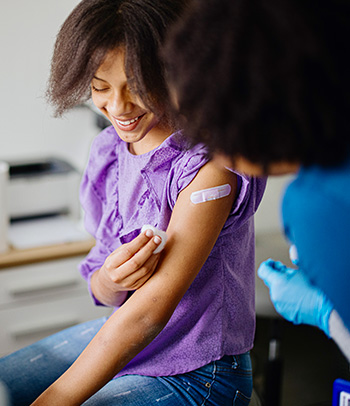Human papillomavirus (HPV) is the most common sexually transmitted infection in the United States. According to the Centers for Disease Control and Prevention (CDC), 85% of people will get an HPV infection during their lifetime. While most of these infections will go away on their own, infections that don’t go away can cause certain types of cancer. Early protection from HPV works best, and the HPV vaccine is safe and effective — preventing more than 90% of the cancers caused by HPV, as well as many other precancers.
Early protection from HPV works best, and the HPV vaccine is safe and effective — preventing more than 90% of the cancers caused by HPV, as well as many other precancers.
Your sexual health is an important aspect of your overall health and wellness. Take charge and remain healthy by staying up to date with the latest information, screenings and vaccines recommended for you.
Learn the Facts About HPV
You can get HPV by having vaginal, anal or oral sex with someone who has the virus. The virus can also spread from intimate skin-to-skin contact or genital touching.
Many people don’t know they have HPV because it usually has no symptoms. In most cases, HPV goes away on its own within two years without health problems. However, when it doesn’t go away, it can cause health problems such as genital warts and certain cancers, including cervical cancer, vaginal and vulvar cancers, penile cancer, anal cancer and some cancers found in the back of the throat.
The good news is that most HPV infections that lead to cancer can be prevented with the vaccine.
HPV Vaccine Information and Benefits

The HPV vaccine is considered very safe. More than 135 million doses have been distributed in the U.S. and its safety has been monitored and researched for more than 15 years. The vaccine is also highly effective. The CDC reports that the HPV vaccine has the potential to prevent more than 90% of HPV-attributable cancers. Since HPV vaccination was first recommended in 2006, cases of HPV-related cancers, genital warts and precancers are all down dramatically.
Early protection works best, and the vaccine is recommended long before a person has contact with the virus. Here are the current recommendations from the CDC for the HPV vaccine:
- All children (girls and boys) ages 11-12 years should get two doses of the HPV vaccine to protect against cancer caused by HPV infection.
- Everyone (women and men) through age 26 years should get the HPV vaccine if they were not fully vaccinated at a younger age.
- Some adults ages 27-45 who were not already vaccinated might choose to get an HPV vaccine after speaking to their health care provider about their risk of infection and the possible benefits of the vaccine for them.
The Department of Veterans Affairs (VA), as well as many other health care providers, offer ways for you to receive your recommended vaccines. At VA, women can receive their Pap tests and HPV vaccines from their primary care provider. You can check with your health care provider, ask for a referral or call your local pharmacies and community health clinics to find the most convenient location for you.
HPV Prevention and Treatment

If you’re planning on having sex, the best way to prevent HPV is through vaccination. In addition, there are other ways to lower your risk of getting infected such as:
- Using condoms properly
- Getting tested regularly for sexually transmitted diseases
- Staying monogamous or limiting your number of sex partners
- Keeping up with recommended screenings
- For women, a regular Pap test can find changes on the cervix caused by HPV.
- For women, a cervical cancer screening can check for high-risk HPV.
- For men and women, you or your health care provider can also check for genital warts, which usually appear as a small bump or group of bumps in the genital area.
There is no specific treatment for the HPV virus itself. However, there are treatments for the health problems it causes. For example, you can get a prescription for genital warts or receive treatment for certain cancers caused by HPV.
Resources
- The CDC offers tons of information on HPV, including symptoms, treatments, related conditions and much more.
- The Office on Women’s Health has answers to questions you may have related to HPV, including information about the vaccine.
- The American Cancer Society provides easy-to-read information on the importance of the HPV vaccine and its effectiveness at preventing certain cancers.







